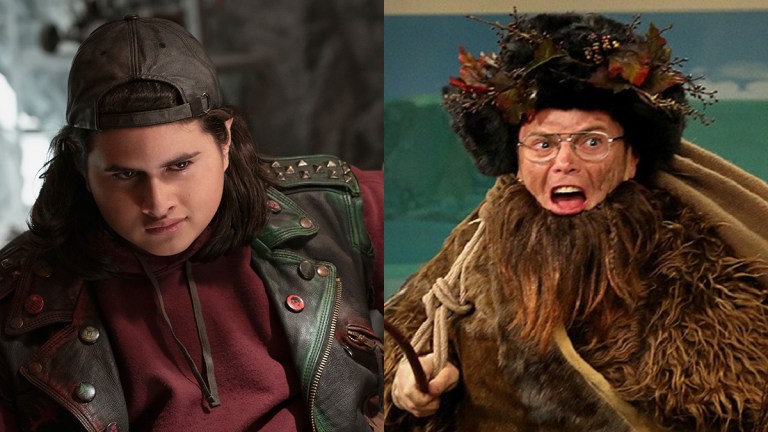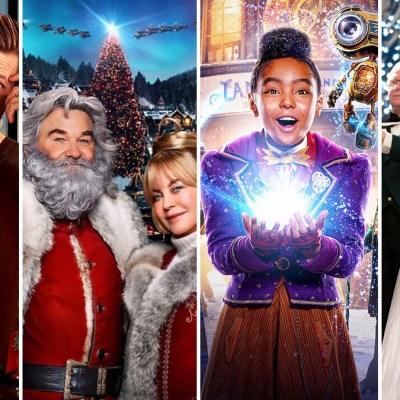The Christmas Chronicles 2: Who or What is the Belsnickel?
We delve into the folklore behind the villainous Belsnickel in Kurt Russell and Netflix’s The Christmas Chronicles 2.

While Netflix’s 2018 holiday film, The Christmas Chronicles, didn’t have a clear antagonist—it was more about saving Christmas—the 2020 sequel pits Santa Claus (Kurt Russell) against an elfin protégé-turned-human-rival, Belsnickel (Julian Dennison). But while Belsnickel, with his odd garb and anti-Claus vendetta, might initially seem not to fit into The Christmas Chronicles 2, the character is actually rooted in Yuletide tradition.
According to German folklore that dates back to at least the 18th century, Belsnickel is a foil of sorts to Saint Nicholas, or Santa Claus: a disheveled man dressed in tattered furs and dirty clothes, often wearing a mask with a long tongue and carrying a switch, he visits homes a few weeks before Christmas to check up on children’s behavior. Belsnickel’s name is a combination of belzen (German for “pelt,” which could describe furs and/or walloping) and Nickel, a nickname for the German Nikolaus.
Belsnickel may have been based on an earlier folkloric figure, Knecht Ruprecht, a servant of Saint Nicholas who first appeared in written records in the 17th century as well as in the Brothers Grimm’s works. Jacob Grimm compared him to a kobold or house-elf, yet the stories describe him as a human. While Saint Nicholas is known for rewarding good children, the little ones feared Knecht Ruprecht and Belsnickel, because both knew exactly how to root out the naughty children. Varying folktales describe how each would ask children if they were naughty or nice, with the latter getting cakes and candies, and the former getting a switch across the back for their behavior.
Neither of these figures should be confused with the demonic Krampus, a much older Austrian companion of Saint Nicholas from a pre-Christian Alpine tradition. Krampus goes back to sometime between the 4th and 9th centuries, though Saint Nicholas became popular in Germany around the 11th century, and Krampus seems to have taken until the 17th century to be fully integrated into the Saint Nicholas legend.
By contrast, both Knecht Ruprecht (from northern Germany) and Belsnickel (hailing from the Palatine region of southwestern Germany) are human men dressed in coats or rags. According to the Pittsburgh Post-Gazette, some historians maintain that they are the same person; even so, the character seems to have clearly split around the time that the Pennsylvania Dutch communities were being established in North America in the 1700s. It was in the early 1800s that mentions of Belsnickel appeared in America, alongside the growing mythology of Santa Claus thanks to Clement Clarke Moore’s 1822 poem “A Visit from St. Nicholas.” Many communities, including Philadelphia, had their own local “belsnickels” who would prowl the streets to punish bad behavior.
The Pittsburgh Post-Gazette goes on to explain that in the early 1800s Belsnickel was a regional favorite of Philadelphia, with Santa being the popular one inNew York City; at this time, both cities were much closer in population size. However, by 1820 New York City had nearly double the population of Philadelphia, and its cultural influence grew proportionally. The post-Civil War popularization of Santa Claus through newspaper editorials and Macy’s appearances ultimately caused the family-centric Santa way of celebrating Christmas to win out over Belsnickel’s mischievous revelry.
For fans of The Office, the name might still ring a silver bell: In the season 9 episode “Dwight Christmas,” Dwight Schrute (Rainn Wilson) brings the holiday spirit to Dunder Mifflin by dressing up as Belsnickel. Decked out in pelts and woodland accessories, he dances around the office declaring his coworkers either “impish or admirable” (for “naughty and nice”). Though Jim Halpert (John Krasinski) initially calls Belsnickel a “dirty, worse Santa,” he is the most delighted by this tradition, especially in Dwight’s own delight that “no one fears Santa the way they fear Belsnickel.”
The Christmas Chronicles 2 seems to have taken inspiration from this folklore while fitting their version of Belsnickel, an elf-turned-human, into the series’ own mythology. Instead of furs, this Belsnickel wears a lot of leather: a studded vest over a sweatshirt, and even fingerless gloves, along with a backwards baseball cap. The look says “sullen teen trying to appear tough,” but as viewers learn his backstory, they see that the supposed villain is hiding his own pain.
As established in the first movie, Santa’s Village in the North Pole is populated by chattery (CGI) elves who make billions of presents and otherwise keep things running. At first, Belsnickel was one of those elves (imagine Dennison, in his outfit, but shrunk down and computer-generated) who nursed a healthy mistrust of humans. But Santa and Mrs. Claus (Goldie Hawn) took him under their wing more so than the other elves, treating him almost as a surrogate child. Santa in particular taught Belsnickel how to go beyond making toys by inventing new treasures.
But as Belsnickel hit his teenage years, he grew jealous of the Clauses’ care for the world’s human children, and began acting out in ways that Saint Nick would definitely call naughty. Unfortunately for elves, if they break the five-part elves’ code, they will be cursed. Once Belsnickel demonstrated envy, lying, selfishness, viciousness, and ego, he was transformed into that which he hated most: a human.
You might also recognize the New Zealand actor behind Belsnickel himself. Of Māori descent, Dennison is an increasingly familiar face, after a breakout role in Taika Waititi’s 2016 adventure-comedy Hunt for the Wilderpeople and playing Firefist in Deadpool 2 in 2018. He will next appear in Godzilla vs. Kong, expected in 2021.
Throughout The Christmas Chronicles 2, Belsnickel goes beyond the role of Santa’s foil and is his outright enemy, waging war on Christmas by trying to steal the Christmas Star that powers the entire Village. In his battles with Santa, he demonstrates his knack for invention, with one scene involving a race through the skies pitting Santa’s sleigh and reindeer against Belsnickel’s souped-up engine guided by jackalotes, or jackal/coyote hybrids.
But while Belsnickel caused chaos in Santa’s Village and endangered Christmas itself for all the world’s children, he clearly was acting out of pain and resentment, and wasn’t entirely evil. He expressed concern over Dasher, after he unleashed Jola the Yule Cat and she nearly killed the reindeer. Like many a teenager acting out, all Belsnickel really wanted was enough attention to be understood.
The final showdown is not a huge battle, but an emotional confrontation. Belsnickel explains how hurt he was, and Santa presents him with the first invention they made together: a mechanical flower that opens up to reveal a clockwork butterfly. Realizing that Santa never forgot their bond, Belsnickel is able to let go of his toxic feelings and is rewarded by being transformed back into his elfin self.
Like his namesake, The Christmas Chronicles 2’s Belsnickel represents a pre-Christmas warning to change one’s behavior before it’s too late. Just as human children would get a week or two to shift from impish to admirable before Santa’s visit, so does Belsnickel get the opportunity to redeem himself before Christmas morning.
The Christmas Chronicles 2 is streaming now on Netflix.


